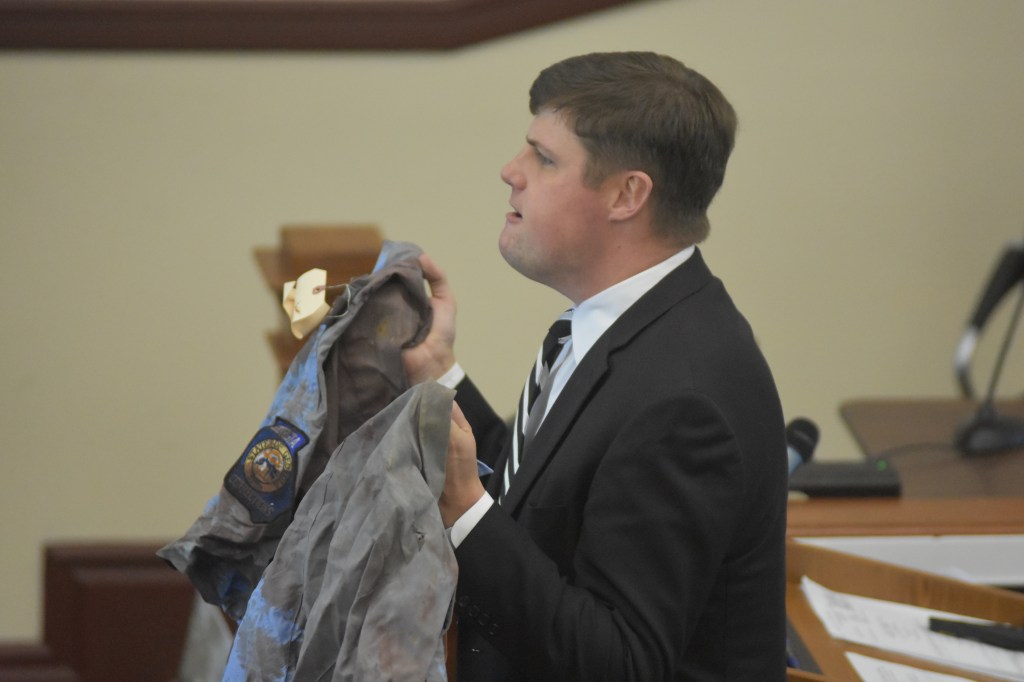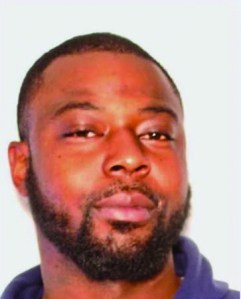Jurors deliberates 3 hours, still no sentence in Rowe case
Published 10:38 pm Tuesday, September 28, 2021

- Ocmulgee Judicial Circuit District Attorney T. Wright Barksdale holds up the officers' shirts during his closing on Tuesday.
EATONTON, Ga. — A jury of seven women and five men deliberated a little more than three hours Tuesday attempting to decide the punishment for convicted murderer Donnie Russell “Whiskey” Rowe Jr.
Trending
Shortly before 7 p.m., the court was informed that jurors had three questions related to the sentencing phase. Their questions were read aloud in the courtroom, answered by the trial judge and then sent back into the jury room.
Ocmulgee Judicial Circuit Superior Court Chief Judge Brenda H. Trammell brought jurors back into the courtroom and informed them they could end their deliberations for the night, shortly before 7:30. Jurors were told to return to the courtroom at 9 a.m. Wednesday to continue deliberations.
Those same jurors convicted the 48-year-old Rowe of two counts each of malice and felony murder in the deaths of Georgia Department of Corrections Sgt. Christopher James Monica and Sgt. Curtis Billue last Thursday afternoon. Jurors began their deliberations about 4 p.m.
During the charge to jurors, Trammell informed them that they could return one of three choices related to punishment in the case. The three options included life in prison with the possibility of parole, life in prison without the possibility of parole, or death by lethal injection.
In closing arguments, Ocmulgee Judicial Circuit District Attorney T. Wright Barksdale told jurors that the prosecution had put forth more than 1,000 pieces of evidence during the trial and sentencing phase.
“And what we know now is that the defendant was the first one through the gate,” Barksdale said. “He was the first one to attack those officers.”
Trending
After the murders and subsequent escape from a state prison transport bus in Putnam County on June 13, 2017, Rowe and co-defendant Ricky Dubose, who has yet to be tried for the murders and other crimes associated with the escape, traveled to Madison in a stolen car and burglarized a home. The escapees later stole a pickup truck from a rock quarry several miles away and “drove it straight to his old stomping grounds.”
He was referring to Tennessee.
“You see Ricky Dubose isn’t from Tennessee, ladies and gentlemen,” Barksdale said. “The defendant is. Ricky didn’t know more know about Chestnut Ridge Church of Christ than me or you. Ricky Dubose didn’t live around the corner from the Hickerson’s home. The fact is that man isn’t sorry for the murders that took place on June 13, 2017. If he was, why did he take the guns? Why did he take those magazines? Why did he stay with Ricky Dubose? Why did he give the ammunition to Ricky? Why didn’t he call the law? Why didn’t he stop Ricky when he was shooting at those deputies on the interstate? Because, as I’ve told you before and the evidence has shown, the defendant and Ricky Dubose were in it together. They were parties to the crime.”
Barksdale told jurors that the case was not about Brad and Christine Lively. Christine is Rowe’s biological mother, while Brad is his stepfather. Testimony from several of Rowe’s relatives introduced by defense attorneys showed that Rowe was mentally and physically abused as a child and that his stepfather often beat him severely.
“This man is almost 50 years old,” Barksdale said. “He had a bad childhood, and I’m sorry for that. I hate that, but there are people in this very room that had an extremely tough childhood; that had obstacles put before them. Life is tough. You’ve heard some horrible horrible things from some of the people who came in this courtroom about how their lives and their childhood was, people like Tammy Mansker, Tabitha Williams and Shawn Craig (Rowe’s cousins who testified), but none of them went around shooting at people, holding knives to people’s throats, and killing them.
“Even the defendant’s old partner in crime, Kenny Kellogg, who used to snort cocaine with him, grew up and got himself two jobs,” said the district attorney.
He also mentioned Mike Schaffer.
“At 4 years old, he walks in and finds his mother murdered and his dad, who has killed himself,” Barksdale said. “He moved from Virginia to Indiana, to Washington and was raised by an abusive grandmother and moved in with his brother before he graduated high school. He chose a different path, despite the obstacles that were in front of him. He’s now a pharmacist.”
Everyone has made bad choices, he said.
“We’ve all had challenges in life, but that doesn’t give us the license to kill and harm others,” Barksdale said. “It doesn’t provide a shield to deflect the responsibility and accountability for our actions.”
The prosecutor told jurors that they took an oath to listen to the evidence and to follow the law to determine what is just.
“That’s where we are right now,” Barksdale said. “That’s where we find ourselves in Eatonton, Ga. this afternoon. You, ladies and gentlemen, have heard the evidence and it’s your duty to come back with a just sentence. You convicted the defendant of murdering two law enforcement officers. You did, based on his choices and his actions — a defendant who was serving life without parole.”
Three days after the Rowe and Dubose escaped from the state prison transport bus, the defendant was involved in a shootout with law enforcement, he said.
Barksdale said Rowe told Ella Smith, a retired corrections officer at Telfair State Prison, something he didn’t forget.
The prosecutor said Rowe threatened her and cussed at her.
He remembered Smith’s testimony from the trial, saying that Rowe told her that he could show her better than he could tell her.
“He’s shown you,” Barksdale said. “What he’s shown you is he won’t stop — just like he didn’t stop that jeep on Interstate 24. He will continue a wave of crime with the force that he hit Mr. Perry, bending the frame of his pickup truck at 120 mph. He won’t quit, because what’s before you, ladies and gentlemen is a career criminal of the most dangerous type.”
Barksdale ask jurors to render a sentence of death. He said it was the only just sentence to send.
Rowe’s lead defense attorney, Franklin J. Hogue, meanwhile, asked jurors to render a different sentence — a life sentence in prison — for the crimes he was convicted of more than four years ago in Putnam County.
“Nearly a month ago when we all met each other down in Grady County, each of you entered the courtroom one at a time in the witness chair and talk to us,” Hogue told jurors. “And each of you was told by the judge that death penalty cases are unique. And they are unique in this one of many respects. We have a jury being asked to impose punishment. In every other case, a single judge imposes the punishment.”
Hogue asks the jury for mercy on behalf of his client.
“Why do we do we select 12 people to impose the punishment in a capital case,” Hogue asked. “One of the many reasons is because the jury, and each of you are the jury, have been selected interposed, sat between the state and the defendant. That is you are the buck. You are the dispassionate judges of justice in a capital case with respect to punishment.”
Hogue told jurors at the beginning of the case that the outrage and anger and moral high ground was right there at that table — alluding to the prosecution team.
“And it’s still there,” Hogue said.





